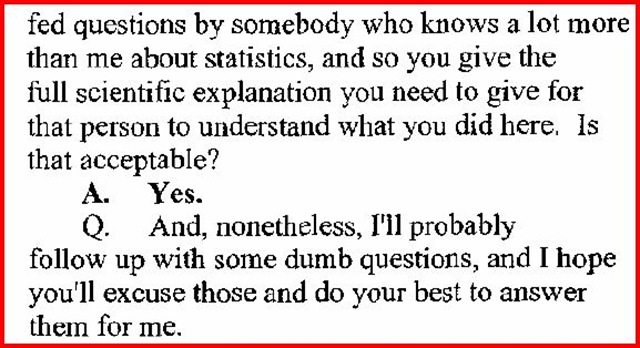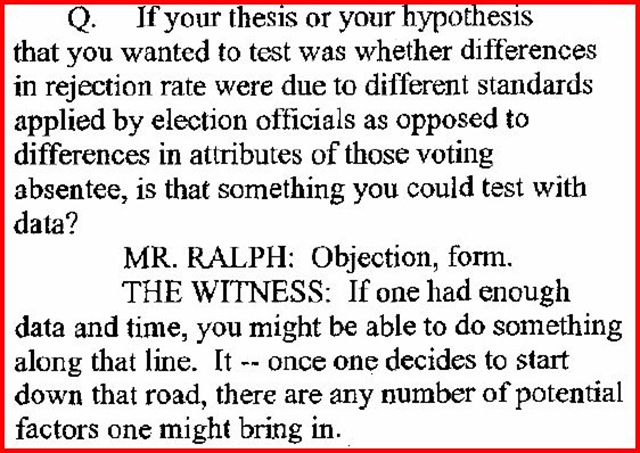In advance of testifying — maybe — in the Coleman election challenge, St. Cloud State college economics professor King Banaian was deposed by an attorney for Al Franken. The transcript of the deposition is online. It is a PDF file, a series of page images and not text that can be linked to directly, so Spot will reproduce some of the images here. The Professor did a pretty good job, but he didn’t have much to work with.
The Coleman camp wants Banaian — a durable conservative and proprietor of SCSU Scholars — to testify about the, well, fishiness in the difference in the rejection rate among various counties in Minnesota.
Franken’s lawyer started with the aw shucks routine that he didn’t know much about statistics, the subject of Banaian’s proposed testimony.
Now, boys and girls, if you ever find yourself in the position of being cross-examined, Spot wants you to promise to be extra leery of an attorney who professes ignorance on the subject of the examination. Because you see, if the lawyer was really fuzzy about any of the subject matter, you can be assured he wouldn’t tell you!
For the first fifty pages or so of the deposition, Banaian is asked about what he did to come to his fishiness opinion. Where did you get the data you examined? From the Coleman people. What did you do with these data? Plugged them into an Excel spreadsheet. Really?
Isn’t that the way it always is, boys and girls? If you choose wisely, grasshopper, good things will happen.
What are you talking about, Spot?
Never mind, grasshopper, it was just a figure of speech.
Professor Banaian lead us on a hike over hill, over dale, all along the dusty trail, stopping for water at the chi squared spring, displaying his mastery of the discipline of statistics and the fishiness of the election results.
Sadly, in the end, it’s irrelevant. After the Professor struts his stuff, Franken’s lawyer gets to the heart of the matter, at about page 60:
And there is this:
Of course, the Franken lawyer suggests some. Banaian goes on to say:
Now the admission:
Well, Professor, Coleman’s lawyers were hoping to do just that: draw the inference that election officials are the explanation for any variation in error rate. This is because they’re trying to establish some sort of equal protection claim under Bush v. Gore. But it ain’t gonna work on Professor Banaian’s testimony. Because, you see, boys and girls, there is no competent evidence in Professor Banaian’s statistical aerial act.
Nice job, Mr. Burman.
Spot is reminded of a quote of John Ralson Saul’s in Voltaire’s Bastards that Spot has referred to before:
Their [the experts'] standard procedure when faced by outside questioning is to avoid answering and instead to discourage, even to frighten off the questioner, by implying that he is uninformed, inaccurate, superficial and, invariably, overexcited. If the questioner has some hierarchical power, the expert may feel obliged to answer with greater care. For example, he may release a minimum amount of information in heavy dialect and accompany it with apologies for the complexity, thus suggesting that the questioner is not competent to understand anything more. And if the questioner must be answered but need not be respected — a journalist, for example, or a politician — the expert may release a flood of incomprehensible data, thus drowning out debate while pretending to be cooperative. And even if someone does manage to penetrate the confusion of material, he will be obliged to argue against the expert in a context of such complexity that the public, to whom he is supposed to be communicating understanding, will quickly lose interest. In other words, by drawing the persistent outsider into his box, the expert will have rendered him powerless.
Here, our intrepid Mr. Burman draws Professor Banaian out of the box.








 We’ll meet at our regular time, six to nine or so, at the regular place, the
We’ll meet at our regular time, six to nine or so, at the regular place, the 





 Tomorrow night, Thursday January 15h, Minnesota State Senator Sandy Pappas will be our guest at Drinking Liberally - Minneapolis. Sen. Pappas will give us her thoughts on the current legislative session, the looming budget deficit, and maybe tell us about a favorite bill or two. She is expected around seven thirty.
Tomorrow night, Thursday January 15h, Minnesota State Senator Sandy Pappas will be our guest at Drinking Liberally - Minneapolis. Sen. Pappas will give us her thoughts on the current legislative session, the looming budget deficit, and maybe tell us about a favorite bill or two. She is expected around seven thirty.

 "Taking cover among civilians." This is a curious locution. When you launch missiles to kill the democratically elected officials of a government -- especially when you target their private homes -- where else do you expect to find them? Gaza is a giant, open-air prison which no one can leave and where, as the story notes, 1.4 million people live in densely-packed urban areas and refugee camps. Where else are the "Hamas militants" supposed to exist in this seething sardine tin except "among civilians"? Naturally, it would be far more convenient if every member of Hamas -- including, again, the democratically elected officials of the government -- painted themselves bright red and gathered in, say, a soccer stadium, where Israel could then drop bombs on them with no muss, no fuss. But we are dealing with the real world, where human beings of every description, profession, ideology and belief must of necessity live and work in close proximity to one another -- especially in the reconstruction of the Warsaw Ghetto that is Gaza today.
"Taking cover among civilians." This is a curious locution. When you launch missiles to kill the democratically elected officials of a government -- especially when you target their private homes -- where else do you expect to find them? Gaza is a giant, open-air prison which no one can leave and where, as the story notes, 1.4 million people live in densely-packed urban areas and refugee camps. Where else are the "Hamas militants" supposed to exist in this seething sardine tin except "among civilians"? Naturally, it would be far more convenient if every member of Hamas -- including, again, the democratically elected officials of the government -- painted themselves bright red and gathered in, say, a soccer stadium, where Israel could then drop bombs on them with no muss, no fuss. But we are dealing with the real world, where human beings of every description, profession, ideology and belief must of necessity live and work in close proximity to one another -- especially in the reconstruction of the Warsaw Ghetto that is Gaza today.